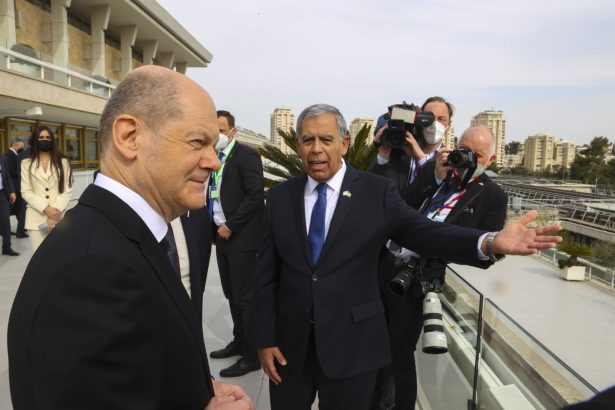Kira Lewis believes the Israeli Labor Party can learn some lessons from a historic social democratic party that was recently on its knees but is now in government, Germany’s SPD.
Social Democratic parties, we are told, are everywhere in retreat. Just two years ago, in Fathom, Eric Lee said ‘the SPD [in Germany] seems to be in terminal decline, suffering one electoral defeat after another. Few expect it to return to government any time soon’[1]. This judgement was reasonable at the time, with the last decade seeing a decline of social democracy in the West. But just over a year ago, Olaf Scholz transformed the SPD’s seemingly terminal decline, gaining 10 per cent in just four months[2] and becoming the first Labour Chancellor in Germany for two decades. And it was no isolated victory. There has been Biden’s success – and historic gains in the recent midterms – alongside left wins in Norway, Australia, and Brazil.
With similar voting systems, a political axis revolving – for a decade and more – around one politician (Merkel and Netanyahu) and an intense national focus on modernisation, technology and international relations, the political scenes in Israel and Germany are not completely dissimilar. Understanding this, learning from it, and delivering a winning campaign in Israel will not be a path walked overnight. The SPD looked inwards to look outwards. Instead of blaming others, it decided that the answer to reversing a historic decline and winning an election was comms, comms, comms.
Having the right leader, with the right pitch, and the right delivery are the three key components of electoral success. Israeli Labor has spent the best part of two decades shifting the leader’s seat around with few notable policies. None of these leaders – from those popular with members to populists better placed to garner outside attention, from soldiers to businessmen – has been able to plug the relentless vote-leaking hole. 40 seats have drained away in 30 years,
Scholz’s SPD spent years in self-reflection, embarking on an overhaul and reform process in 2017 to decide whether they were going to remain left-wing or pitch for reform from the centre – an ideological question Labor may do well to consider. Not since the Godesberg Programme in 1959, where Marxism was finally dropped as an ideology and nationalisation as a major goal, had the SPD had such a pivotal moment of self-reflection. An internal report, Learning from Mistakes[3], noted that the party needed to deliver a uniting message for all Germans. And so, despite being satirised in Germany for his robotic efficacy, ‘Scholzomat’ repeated his lines over and over at rally after rally. He knew that the path to power lies through ‘working people’, but the problem faced by left wing leader after leader, is that ‘working people’ are not always all that ‘left wing’.
Thus, while siphoning voters from the far left, Die Linke, the SPD also gained support from previous voters of the far right Alternative für Deutschland, who both liked his messages of respect for workers and emerging technology. So, too, it achieved success with centrist voters who had backed Merkel in the past four elections but had no strong allegiance to her party. Scholz targeted all of society, promising pragmatism, dependability, and respect. In stark contrast, Labor’s key message in the recent Israel elections seemed to focus solely on the Tel Aviv light rail, and on turning out their own, now narrow voting base. The leader of Israeli trade unions, once 75 per cent of the Israeli workforce, was more interested in Gantz’s message on security. The historically left kibbutz membership is at an all-time low).
The SPD, on the other hand, set out a comprehensive plan for Government – not policies to be tacked onto one. When many Israelis associate ‘Left’ as being pro-Palestinian and ‘Right’ as being tough on security, Labor’s challenge is to address the need for tough security and then to lay out plans for an alternative to the status quo, not challenge the status quo first.
Labor wants peace with Palestinians, they just don’t stress it. It is because of this that they are both admired for morally admirable wishful thinking and roundly shredded by their significantly more powerful opposition parties.
Progressive parties are no stranger to having their records in government torn apart by critics, however. UK Labour have Iraq and PFI contracts and the SPD has been criticised for perceived closeness to Russia, its leader, and former Chancellor Gerhard Schroeder moving smoothly from the SPD to be Chairman of Nord Stream 2 and, in 2022, to a nomination to join the board of Russian state-owned Gasprom. Images can be changed.
The image of Israeli Labor, simultaneously idealised for, but stunted by, its past, has led to two things being true: the nostalgia held onto by many older Labor voters for the liberal years of peaceful accords and Ben-Gurion Zionism also means that for much of the rest of the electorate, Labor is the party of sympathising with the PLO. Where Labour’s Good Friday Agreement largely stands the test of time for just peace-making, Labor’s Oslo Accords are ripped apart for fraternising with terrorists and endangering the existence of Israel. Instead of attempting to shift or correct this narrative – or rebrand entirely – Labor merely hopes a new leader, or a few new policies, will do the job. But it is not just a policy problem, or a leader problem: the entire image of the party has broken down bit-by-bit over many voters’ lifetimes. It is not just a new platform Labor needs, but a fundamental rethink that is able to project pride in its past, policies for the present and hope for the future.
Labor is beset by accusations that they are terrorism apologists and are not patriotic about Israel, with their preferred two-state solution dismissed as unworkable. They are defensive over Israeli-Arabs being in the Knesset rather than being proud of that achievement. When these accusations are left to fly, rather than being attacked head-on, it leaves a messaging vacuum that is filled by the right. Voters are left to believe that as they are security-minded and patriotic, they must clearly not be left wing at all. That to be left, or ‘leftist’ as the label goes, means to hate Israel and your own family’s safety – much as in the UK Jeremy Corbyn was attacked by David Cameron in 2015: ‘The Labour Party is now a threat to our national security, our economic security and your family’s security’[4].
Learning from Mistakes[5] also understood that German politics had been dominated by the figure of Angela Merkel, her popularity, her trustworthiness, and her politics. The report noted it was about finding her true successor, not merely the next German Chancellor. Much like Israeli parties positioning themselves as pro- or anti-Bibi, rather than autonomous entities projecting a clear bright future for Israel, German opposition parties had, over decades, lost their identities. And what happens when the person you are positioning yourself against is quite popular with – or is at least not hated by – half the country?
You lose.
A plan for government, therefore, cannot just be we are not them. Scholz’s success showed that by pitching the qualities of strength, respect, and experience that the German public admired in Merkel, Labor presented an alternative that people could identify with and vote for.
And you have to get the comms right. According to Haaretz, Labor spent nearly £150,000 on digital advertising on Google and Facebook during the campaign.[6] In Germany too, and long before election day, the SPD had expanded its social media department. Political parties’ engagement in the social media realm is without a doubt essential today, and a sure-fire way for voters to see your messages ten times over. But your digital ads must cut through with your target voters. If your core messages are poor, the lines you are advertising will also be poor. Labor focused almost entirely on promoting party leader Merav Michaeli’s Facebook page (spending 531,000 shekels) rather than telling voters what Labor could do for them. Though the SPD also promoted Scholz to German Facebook users, they presented him as a problem-fixer, using the slogan ‘Scholz packt das an’ (‘Scholz can tackle it’), a play on the acronym SPD, and they pushed policies alongside each of the party’s core values, particularly the value of ‘respect’. The SPD did not just hope voters would take a liking to a leader based on an assumed idea of what they stood for.
Moreover, the messages were not always well targeted. Labor apparently invested a tiny amount in digital advertising in Haifa[7], which had historically been a Party stronghold, and in the end attracted only 6,600 votes (less than 5 per cent) of the total Haifa vote. If you give up on your voters ever seeing your messages in the first place, it is hard to expect them to care. In contrast, in the election before Scholz’s win, the SPD were the biggest advertisers out of all political parties[8], keeping the idea of a relevant SPD ever-present on social media users’ feeds. Social media algorithms create radical echo chambers, so pushing paid advertising is often the only way to cut through to voters online. Removing huge amounts of previous voters from targeting pools, only hoping key supporters may turn out, may have proved damaging to an already small base for Labor. This poses a wider existential question, as when parties lose voters, they lose supporters, and therefore future election budgets decrease. Fewer committed activists and less allocated funding leads to a reduced ability to push messaging and make voters see your policies. Which in turn means fewer seats. Once complacency sets in about this vicious cycle, a vague hope that voters will come back to you replacing a hard-headed plan, it is easy to see how a party can become seen as irrelevant. Again, to address that slow, steady withering into oblivion, a fundamental rebrand and reflection is necessary.
The General Secretary of the SPD, Lars Klingbeil was rightly exultant on election night: ‘The SPD is back on the pitch!’. In Israel, while Yair Lapid sought modernisation and looked outwards to where a moderate alternative could play, Labor looked inwards. Labor did little to distinguish itself from other parties, and it seems there has been little deep reflection afterwards about the defeat. Instead, Lapid has been blamed, as if they were not two separate, competing parties. Labor might instead ask itself why Yesh Atid improved its vote and why their campaign had a robustness to it that Labor’s lacked. Yes, it is easier to catch voters’ attention when you are already speaking from high office, in the Knesset and at the UN, but, equally, with that comes political risk. You can get stuff wrong in full view! It is hard odd to focus criticism on the party that increased its vote share, increased its vote total, had a broadly popular leader but was ultimately let down by potential coalition partners either not pulling their weight, or, in Meretz’s case, falling below the threshold entirely.
In that Fathom article two years ago, Lee said the ‘Israeli Labor Party is dying’. But it isn’t dead yet. With four seats in the Knesset, this is still a small improvement on their all-time low of just three seats in 2020. No party deserves to exist out of entitlement alone – every party must know their contributions to their country, their aspirational platform to govern and what makes them distinct from their opponents. Israel needs Labor now more than ever, for peace and partnership with its neighbours and allies around the world, for a safe and equitable country for all Israelis and for a real hope for democratic and viable statehood for the Palestinian people. If, under a similar voting system, Scholz understood that self-reflection, better comms, and a clear message of leadership could transform the SPD’s fortunes, maybe a period of similar introspection and transformation could be the foundation for the revival of Labor in Israel.
[1] Lee, Eric, IsraelVotes2019 | Why the Israeli Labor party is dying, Fathom Journal, May 2019 https://fathomjournal.org/israelvotes2019-why-the-israeli-labor-party-is-dying/
[2] Marin, Dalia, ‘How Olaf Scholz won Germany’, Social Europe, 29 September 2021 https://socialeurope.eu/how-olaf-scholz-won-germany
[3] Jana Faus and Horand Knaup, ‘Mistakes made – lessons learnt’, October 2021, https://library.fes.de/pdf-files/a-p-b/18357.pdf
[4] David Cameron, Twitter, September13 13 2015. https://twitter.com/david_cameron/status/642984909980725248
[5] Jana Faus and Horand Knaup, ‘Mistakes made – lessons learnt’, October 2021. https://library.fes.de/pdf-files/a-p-b/18357.pdf
[6] Omer Banjakob, ‘Israel’s Digital Campaign Trail: Who Spent a Fortune Down South and Who Blew Their Money’, Haaretz, 15 November 2022 https://www.haaretz.com/israel-news/security-aviation/2022-11-15/ty-article/.premium/israels-digital-campaign-trail-who-spent-a-fortune-down-south-and-who-blew-their-money/00000184-7711-d8e3-a5bd-f7f3347c0000
[7] Banjakob 2022.
[8] Statistica, Online advertising by political groups in Germany from February to May 2019, by number of ads, May 2019 https://www.statista.com/statistics/1034442/political-groups-in-germany-online-advertising-by-number-of-ads/




































